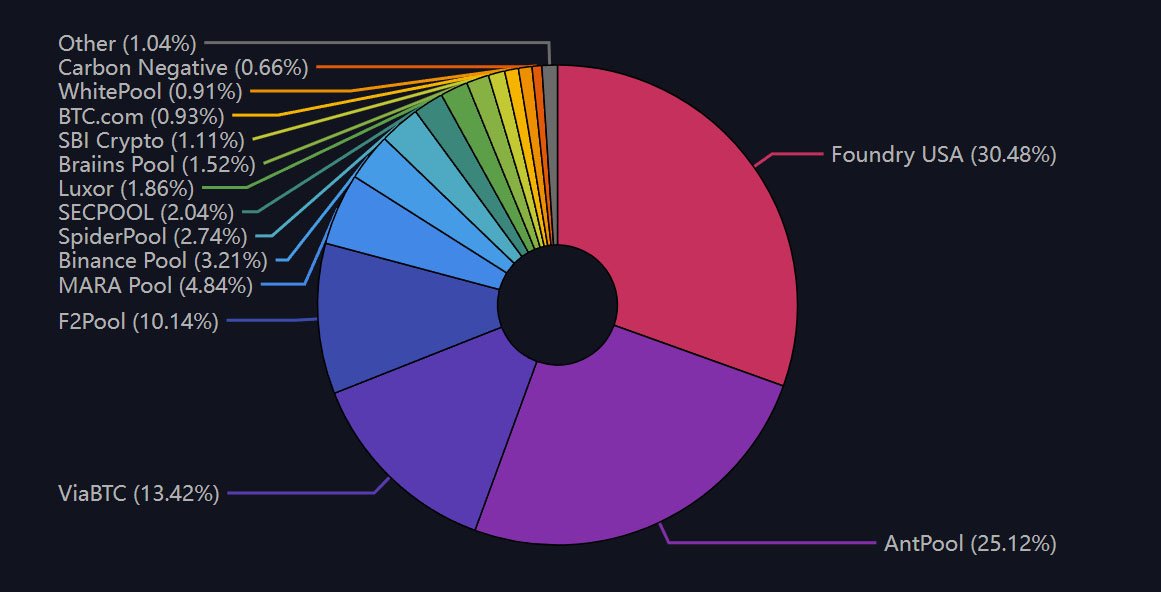OCEAN, a new name in the Bitcoin mining industry, has introduced a groundbreaking protocol called DATUM (Decentralized Alternative Templates for Universal Mining), designed to address growing concerns over the centralization of Bitcoin mining.
This new protocol aims to restore the decentralized nature of mining by giving individual miners more control over the block creation process, a move that could significantly reshape how Bitcoin’s network operates.
Bitcoin, the world’s most valuable digital currency, was created with the vision of decentralization. Its inventor, Satoshi Nakamoto, intended for individuals and small groups to participate in the mining process, ensuring no single entity could control the network.
However, over the years, large mining pools have come to dominate the Bitcoin network. These pools control the creation of block templates, which determine which transactions are included in a mined block.

This has led to concerns over potential centralization, which could expose the network to risks like transaction censorship or even 51% attacks, where a single entity controls the majority of the network’s hashing power.
Currently, more than 50% of Bitcoin’s hashrate is concentrated in just two large mining pools. This centralization not only threatens Bitcoin’s decentralized ethos but also poses risks to its security and resistance to external pressures.
In response to these concerns, OCEAN developed DATUM, a protocol that gives individual miners the power to construct their own block templates while still participating in a mining pool for consistent rewards.
This solution is designed to decentralize block construction and return control to individual miners, aligning with Bitcoin’s original vision.
Jason Hughes, VP of Engineering at OCEAN and the author of the DATUM codebase, explained the importance of this new development:
“DATUM is a leap forward in decentralized mining, making true mining available for everyone with as little friction as possible. It enables miners to be actual solo miners and to do all of the things miners were always intended to do for the Bitcoin network, while still reducing their variance through pooled rewards.”
DATUM is open-source, lightweight, and highly portable. Written in C, it can easily run alongside a Bitcoin full node, making it accessible to miners of all scales, from large operations to solo miners who want more control without the technical hurdles.
Luke Dashjr, co-founder of OCEAN, underscored the significance of this launch, stating:
“The launch of DATUM is a pivotal moment for the Bitcoin mining community. We’re moving block creation back to the individual miners, just as it was intended in the original whitepaper. With DATUM, we’re ensuring the security and decentralization of the Bitcoin network, safeguarding its future.”
DATUM is not the first attempt to decentralize the mining process. Stratum V2 (Sv2) is another protocol designed with a similar goal in mind, allowing miners to control their own block templates.
However, OCEAN believes DATUM offers several advantages over Stratum V2. Notably, its lightweight and portable design means that it is easier to implement and can be more seamlessly integrated into existing mining setups.
While Stratum V2 has made progress in decentralizing some aspects of mining, DATUM takes a more focused approach, especially with its user-friendly design aimed at bringing control back to the individual miners.
This protocol is seen as a significant step in maintaining Bitcoin’s core principles of decentralization and security.
The introduction of DATUM has garnered strong support from decentralization advocates and prominent figures in the Bitcoin community. Jack Dorsey, lead investor in OCEAN and a longtime supporter of Bitcoin, emphasized the importance of decentralization for the long-term success of Bitcoin.
“Continued decentralization and permissionless mining are essential for Bitcoin’s long-term health,” Dorsey stated. “OCEAN’s latest innovation with DATUM makes decentralization easier for modern miners.”
Mark Artymko, president of OCEAN, announced the successful mining of the first Bitcoin block using DATUM on September 30, signaling a key milestone in the protocol’s development.
Currently, DATUM is in a closed beta phase, with a public beta release expected on October 18. OCEAN has invited interested miners to participate in the beta phase, offering them the opportunity to experience the protocol firsthand before its wider launch.
In summary, the launch of DATUM has the potential to reshape Bitcoin mining by addressing one of the network’s most pressing issues—centralization.
By giving the power back to individual miners, DATUM not only enhances the security and resilience of the network but also reduces the risks associated with large mining pools controlling too much of the hashrate.
OCEAN’s commitment to maintaining Bitcoin’s decentralized nature comes at a critical time, as regulatory pressures and technological advancements continue to challenge the digital asset’s foundational principles.
DATUM’s success could pave the way for future innovations in decentralized mining and inspire similar developments across the Bitcoin industry.
As Bitcoin continues to grow, protocols like DATUM will play a vital role in ensuring that it remains a secure, decentralized, and open network, true to the vision laid out in its original whitepaper. With DATUM, the future of decentralized mining looks brighter now.










